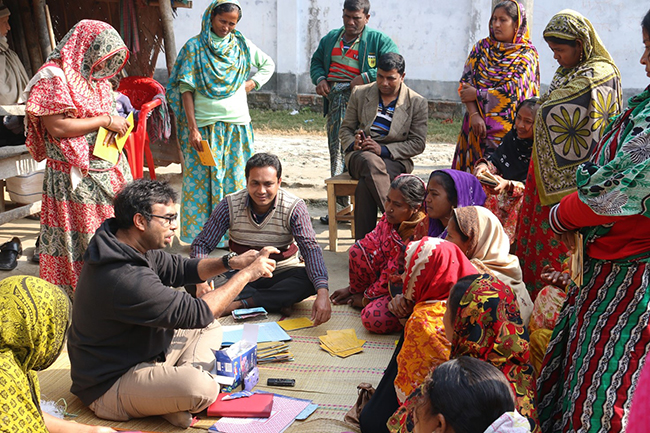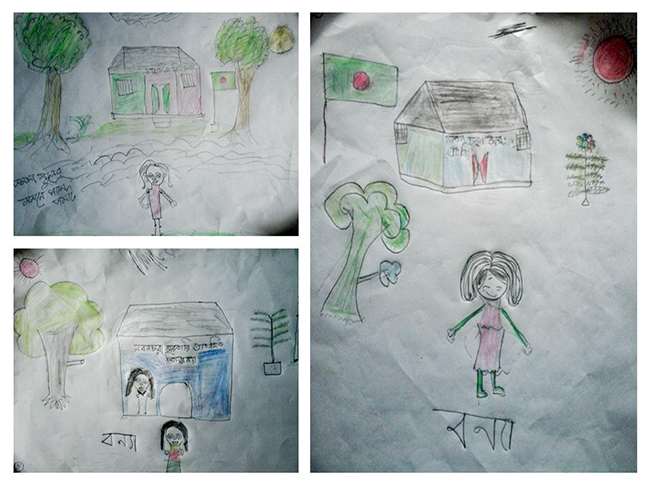Tuesday 24 September 2019 12:04pm

Dr Ashraful Alam (seated front left) talks camera basics with research participants in Bangladesh.
Recently appointed Geography programme lecturer, Dr Ashraful Alam, says his experience as an architect and academic has underscored the importance of planning that “listens to people’s stories”.
Before coming to Otago, the Planning and Environmental Management specialist completed a Bachelor of Architecture from Khulna University in Bangladesh. He then ran his own architectural firm until 2009, when he relocated to Hong Kong to undertake a Master of Planning degree at the University of Hong Kong.
While teaching the undergraduate architecture programme at Khulna University he became dissatisfied with his architectural work, which he felt was “done mainly for the benefit of society’s elites”.
“A professor opened my eyes with critical questioning around the role of the profession – he said ‘architects or planners tend to follow champion architects and planners – when will you learn to follow people?’

Dr Ashraful Alam
“So, for me, the Master of Planning degree was a revelation – it unsettled my professional chauvinism. By the time I finished my masters, I knew the value of listening to people, the supposed ‘non-experts’ who most often had the best knowledge about the environment.”
Dr Alam returned to Bangladesh and worked for the Asian Development Bank as a local planning consultant to implement a water supply project in Khulna.
In 2013, he began a PhD at Macquarie University, Sydney and taught in the Department of Geography and Planning as an Associate Lecturer before again relocating to join the School of Geography at Otago.
Dr Alam’s research has mostly focused on migrant communities and how they settle in cities. He has worked with internally-displaced migrant women in Bangladesh, and his ongoing research looks into how first-generation immigrants of South Asian Muslim background imagine their Australian identities after years of living in Sydney.
Travelling between countries for work and study over the past 10 years has given him insights into what it is to be a “migratory bird”.
“I am originally from Bangladesh and later became an Australian citizen. My two children are also travelling with me so I guess my research interests grew naturally – I want to learn more about journeys of migration, migrants' entry to a new urban contexts as strangers, how they settle in and make sense of home over time, the kinds of vulnerability. Those transitory circumstances inform different narratives of places and cities.”
A people-centric approach to research
Dr Alam’s own migratory experience helped him to develop an approach to research that is based on “getting people's stories right in the first place”.
During recent fieldwork involving internally displaced children in Bangladesh, he held workshops at which young participants explained their problems through artwork.
“When I do research about migrants, children, and homeless communities, I research with them. I often use participatory methodologies in my research – such as participatory photography, mapping, shadowing, and walking interviews – to empower my participants. So my research is always informed by the participants’ own stories and experiences.”
Otago’s appeal
Dr Alam was attracted to Otago’s School of Geography because a democratic selection process was evident when he applied for the job. It was also apparent that the Master of Planning programme valued flexibility.
“This discipline gives the opportunity for critical engagement with feminist theories and philosophies of environment justice and political ecology which can better inform planning practice. This made the decision easy.”
He is excited at the prospect of exploring mobility in Pacific communities, refugee mobility, resettlement issues for coastal communities in the face of sea-level rise and homeless communities living in night shelters.
Dr Alam’s initial exposure to vibrant Māori cultural and philosophical values has also led him to see how much these can offer and inform planning and urban design theories which have historically been premised on Anglo-European discourses.
“As a university town, Dunedin has unique planning dynamics. It's a small city, far from the rest of the world, and while it’s geographically in the Southern Hemisphere it has distinct characteristic differences from other cities that are recognised as southern cities. As academics, it is our responsibility to discover those unique strengths and characteristics to shape planning for Dunedin and other New Zealand cities.
“I am preparing for potential grant applications for research that might explore how the university, its students, academics and international scholars shape Dunedin’s spatiality, and how the city can remain regionally competitive.”
Plans for the Master of Planning
As coordinator of the Master of Planning programme, Dr Alam’s role will build on the qualification’s 30-plus year legacy producing skilled planning graduates who work in New Zealand and overseas.
“Our teaching faculty is internationally recognised. We have a strong connection with the professional communities who support the planning programme through guest lectures. Our programme is New Zealand Planning Institute (NZPI) accredited. Coupled with the reputation of the University of Otago, our planning graduates are highly sought after by employers and secure jobs before they finish their degree.
“We would like to see our planning graduates as ‘think-plus-do tanks’ who focus on inclusive planning that is more than just aligned with relevant legislation or higher order policy objectives, but which also does real good to the community.”
As a planning academic, Dr Alam says it is important to be critical about how planning operates in, is influenced by, and also reshapes society.
“My experience in practice and the academic side of planning means I want more informed planning graduates who are conscious of both local and broader, I would say planetary issues such as climate change crisis and environmental justice. We have an excellent reputation, and part of maintaining this is ensuring our graduates know how to do good in the community.”
Below: sketches by young research participants (aged six to 17 years) in which they explore challenges in Khulna's slums, such as long-term water inundation which impacts on school attendance rates.

